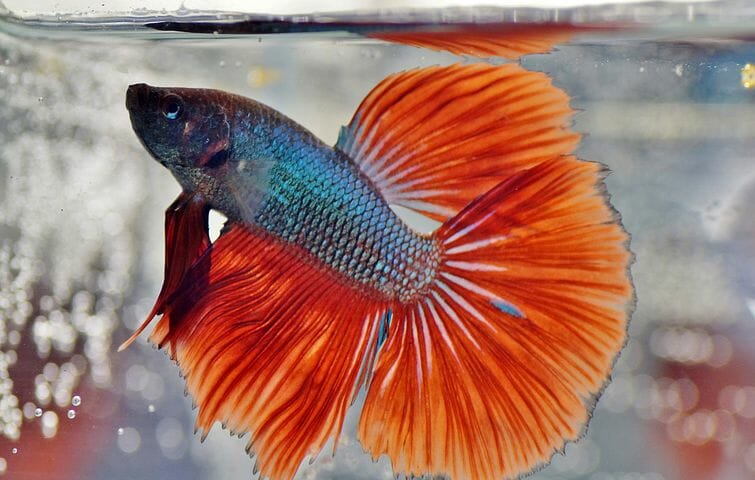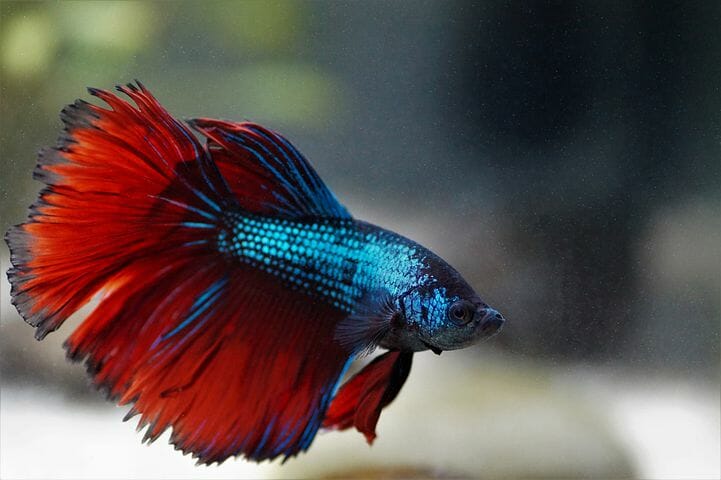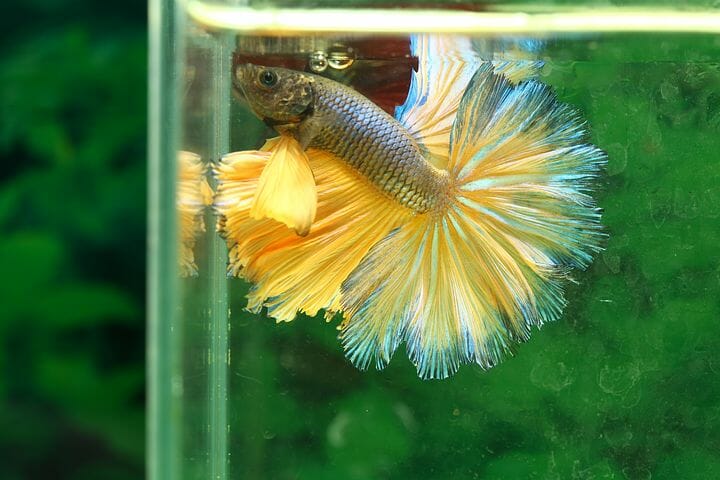Do Betta Fish Need Light: Reasons, Benefits & How to’s
The betta fish (Betta splendens) is a highly popular aquarium fish and one of the most common ornamental fish in the world. The betta is also very popular among its owners as it has an interesting and beautiful coloring pattern, which makes it a perfect addition to any freshwater aquarium.
Betta fish do not require light 24/7 to live, but they will appreciate natural sunlight or a few watts of artificial light if you keep them in an aquarium. Just like humans, betta fish follows a pattern of daylight and darkness regularly, so leaving them in complete darkness for days will not only result in health problems but may also lead to behavioral issues.

Table of Contents
How Many Hours of Light Do Betta Fish Need?
The betta fish requires about 8-12 hours of light each day. If your tank contains other aquatic plants, they will also need light to grow and flourish. Some people recommend increasing the light exposure times during the winter months to help keep their betta fish happy and healthy. With that said, betta fish will do just fine with 12-16 hours of darkness daily.
Do Betta Fish Need Light at Night?
Yes, betta fish do need light at night. Although they are not photosensitive like some other fish species, bettas still prefer darkness to bright light and will naturally move towards the brighter area of their tank to hunt and eat. For this reason, it is important to provide a few watts of artificial light in your tank at night if you want your betta fish to be comfortable and healthy, and most importantly if you think your betta fish is not getting the recommended 8-12 hours of light.

Can Betta Fish See in the Dark?
Betta fish can see in the dark just like any other animal, however, they may not be able to see as well as they would during daylight. As a result, they will prefer to swim in clearer areas of a tank if the lighting is not bright. Keeping a few watts of artificial light turned on at night will help them get the brightness and stimulation they need to feel comfortable and healthy.
What Are the Benefits of Light in Your Betta Fish Tank?
Some benefits of providing light to your betta fish tank include:
- Helping keep your betta fish healthy and comfortable;
- Promoting activity and breeding in your bettas;
- Providing a brighter environment for hunting and eating improving water clarity;
- Improving water quality by reducing nitrate levels;
- Increasing oxygen levels in your tank and aquarium;
- Providing a better environment for spawning; and
- Improving the overall aesthetics of your tank by adding color to the water surface.
How to Provide Light for Your Betta Fish?
There are a few ways to provide light for your betta fish tank. You can use artificial light, such as an LED or fluorescent fixture, or you can use a natural source of light, such as sunlight or moonlight. The main thing is that the lighting should be bright enough to stimulate activity and breeding in your bettas but not so bright that it disturbs their sleep habits.
Natural Light
The best way to provide light for your betta fish tank is with natural sunlight or moonlight. This can be done by opening the door of the tank slightly during the daytime so that a small amount of light enters, or by using a daytime lighting setup that allows you to simulate natural sunlight. Be sure to avoid bright lights such as searchlights and halogen lamps, which may cause injury or stress in your bettas.
Bettas do well with the right amount of sunlight exposure and can be supplemented with natural light from windows or artificial lighting while keeping the tank in a brightly lit area. If you live in an area where it is difficult to keep your tank indoors during the day, you can use a fluorescent tube aquarium lamp to provide supplemental light.
Effects of Too Much Sunlight
Sunlight is a good thing for your betta fish. Sunshine provides your pet with the light that it needs to live and thrive. In addition, sunlight helps to produce vitamin D which is essential for healthy skin and hair development in bettas. However, it has its cons if your fish tank is exposed to high intensity of sunlight for a prolonged period.
- Algae bloom: Algae blooms are a common problem in fish tanks, and bettas are no exception. Algae blooms can cause your tank to become cloudy and diluted with toxins. Affected fish may also experience decreased appetite, poor health, and death. To prevent algae blooms from occurring in your tank, make sure to regularly perform water changes (every 2-3 weeks) and add a balanced diet that includes nutrients for algae prevention. Additionally, add a filter that removes harmful particles and chemicals from the water. If you notice an algae bloom become established in your tank, it is important to remove the offending algae using either a net or grasper tool before it causes further damage to your fish.
- Temperature shock: Too much sunlight can also cause your fish tank to become too hot. This is known as temperature shock, and it can be deadly for your pet. Fish tanks that are subjected to high temperatures for an extended period may suffer from seizures, heart failure, and even death. It is important to make sure your tank never gets above 80 degrees Fahrenheit (27 degrees Celsius).

Artificial Light or Colored Artificial Light
Many people choose to use artificial light as a way to provide supplemental light for their bettas. Artificial lighting can be used in both regular and compact fluorescent lamps, providing the same amount of energy per wattage as incandescent or halogen bulbs. Compact fluorescent lamps come in both low-wattage (2 watts) and high-wattage varieties (12 watts), making them perfect for smaller tanks or setups where space is a concern. As a general recommendation, 1.5-4 watts of artificial light per gallon in water in your fish tank.
Many people choose to use colored light with their bettas as a way to make their tank look more lively. Different colors of artificial light have different effects on fish, and some can be quite harmful. It is important to do your research before using any type of colored lighting in your tank and to test out the effect it has on your particular fish before using it long-term.
When using artificial lighting, it is important to be aware of the time of day that the light is being used. Artificial lights should not be used during peak daylight hours, as this can cause your tank to become too bright and stressful for your fish.
Effects of Too Much Artificial Light
- Stress and overstimulation: This can lead to problems such as increased activity levels which may cause your pet to hit its teeth on the tank’s glass or plastic, display aggressive behavior including biting and chasing others in the aquarium, difficulty recognizing other fishes or objects in their tank, health problems such as reproductive issues, behavioral changes, and even death.
- Loss of appetite: Providing too much artificial light can also have an appetite-suppressant effect on your betta fish. This means that the pet will stop eating and may even die as a result. The best way to avoid this is to gradually introduce more light over time, rather than suddenly switching from darkness to bright lights. Additionally, adding a small amount of food weekly will help keep your betta healthy and fed.
What Happens if You Don’t Provide Light to Your Betta Fish?
In the absence of artificial light, bettas will naturally hunt and feed during the night. If left unsupervised in a tank without any lighting, they may begin to eat small fish or other objects that are not appropriate for their diet and can even cause injury. Additionally, without regular interaction from you or another human being in their tank, bettas may start to display signs of aggression such as chasing others or biting them.
In addition, the absence of light will also cause your betta to become stressed and inactive.